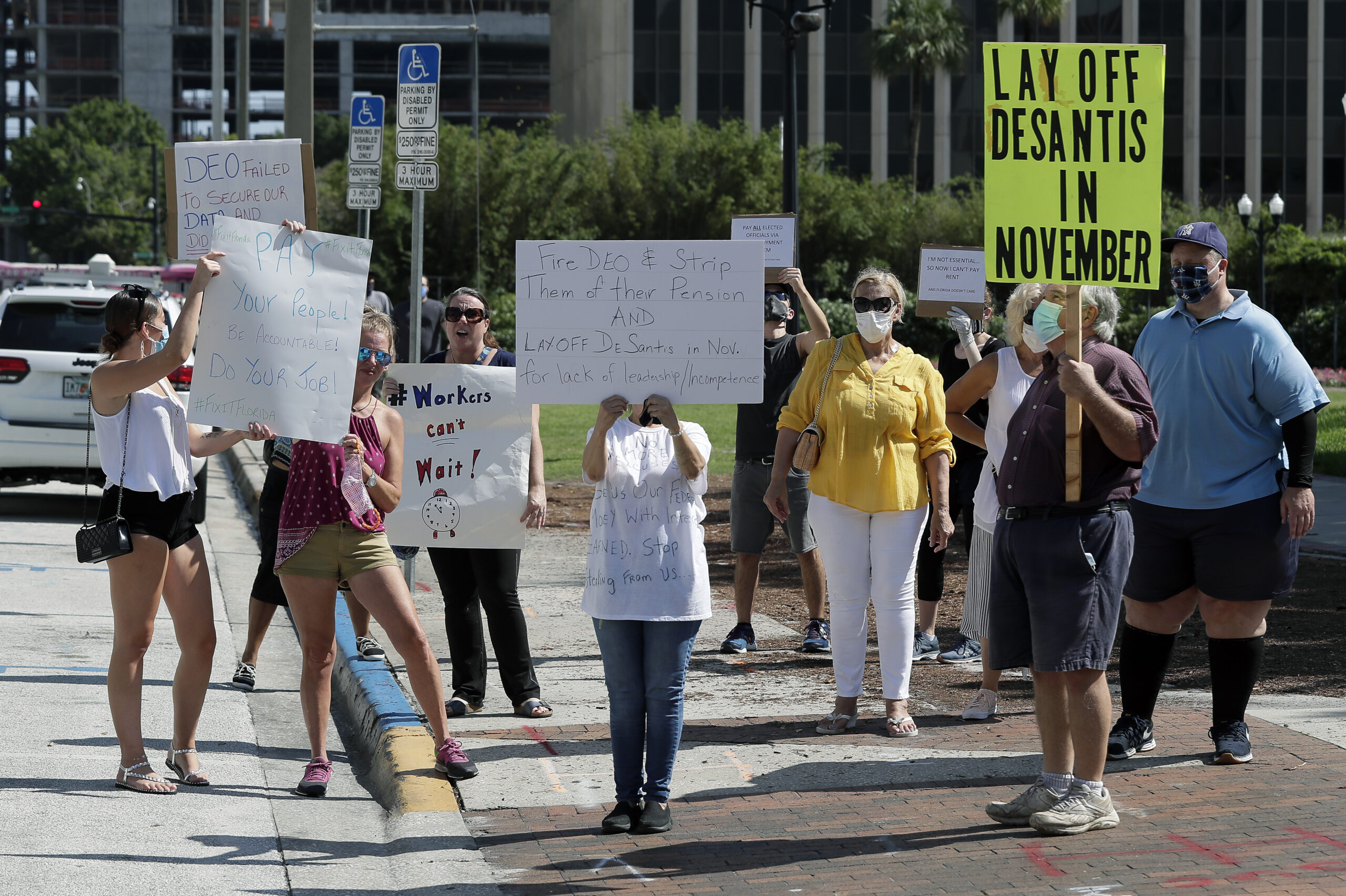
An organization representing labor unions in Florida said Gov. Ron DeSantis’s decision to turndown $300-per-week unemployment payments will pull $800 million from Florida’s economy. The American Federation of Labor and Congress of Industrial Organizations launched a campaign urging DeSantis to change his mind on prematurely ending the federally funded program.
Listen:
The $300 unemployment supplement comes from money approved in President Joe Biden’s American Rescue plan. It’s supposed to last into September, but the Governor said he’s ending it early to get Floridians back to work.
“No matter where I go in the state of Florida, people will tell me, ‘Florida’s great. Thanks for what you’re doing Governor. We just need to find more people to want to work’” DeSantis said last month. “So, the jobs are there.”
False narratives
But Rich Templin, director of politics and public policy with the Florida AFL-CIO. Said that’s based on a false narrative. Florida has one of the lowest unemployment compensations in the country, with a max of $275 a week. Many get far less. The $300 brings that to $575 a week, but most don’t even get that.
“Over 80 percent of our unemployed have never gotten a dime,” Templin said. “They weren’t getting state benefits last year and they’re not getting state benefits now. So almost no one is getting $575 per week.”
Many industries, especially live entertainment and tourism industries in Florida are not back to work yet. Meaning, as jobs are still returning, some aren’t returning fast enough. And many of those workers don’t qualify for state unemployment. The $300 federal money is all they receive.
“These are self-employed workers, gig workers; low-wage seasonal workers who can’t count their most recent quarter of work,” Karen Woodall said. “ So they can’t show that they’ve made enough money to qualify even when they have.”
Woodall works with the Florida Center for Fiscal and Economic Policy. She said Florida is still in the midst of an economic crisis impacting vulnerable Floridians. The Center on Budget and Policy Priorities tracks current economic hardships. It found nearly 1.5 million adults in Florida, about 10 percent, reported they don’t have enough to eat. Eleven percent of adults with children, about 550,000 Floridians, reported the same.
Real-life consequences
The federal benefit amounts to about $7.50 an hour, below the minimum wage. Templin said pulling that money doesn’t just hurt Floridians struggling to make ends meet. It pulls money out that recirculates through the state’s economy.
Jim Ricer owned his own business for 19 years but lost it due to COVID-19. Ricer is one of the Floridians set to lose the federal benefit. He’s also one who’s relied on it as his sole source of income. He said as a 53-year-old with health problems it’s difficult to find one of the jobs available in Florida. As bills like mortgage payments become due again, Ricer said every cent and every minute of continued benefits counts. He hopes DeSantis will change his mind.
“You’re going to end up putting people on the street,” he said. “You better go to sleep tonight knowing that.”
The idea of a worker shortage comes largely from the hospitality industry that says it’s struggling to fill positions as businesses reopen. But there’s no data linking any lack of workers to unemployment benefits.
Forcing hands
State Representative Anna Eskamani, an Orlando Democrat, pushed for a revamp of Florida’s unemployment system – including increasing weekly benefits – during the recent legislative session. But her bills were blocked by the Republican-controlled legislature. She said ending the federal benefits will unfairly force jobless Floridians to take pay cuts and work outside of their profession in order to make ends meet. She said they should be supported as the state reopens. Or when it does, there might be even more dire skilled labor shortages.
“To continue to demonize workers who are trying to get back out there but looking for the right fit,” she said. “It is wrong, it is cruel, it is political and we are here to call it out.”
The AFL-CIO has pledged to spend the next few weeks relentlessly pushing back on the Governor’s decision, even if it’s an uphill battle. But for Floridians like Ricer who don’t know if they can survive after the federal benefit ends, the campaign offers enough hope to keep fighting.
“Hope is all I have. And the fact that they’re gonna take hope from me matters,” Ricer said. “I am gonna fight for every bit of it. I still have hope and without hope, I don’t have much left. So if I can get hope and get someone else to hear my thoughts, I’m not gonna stop.”














